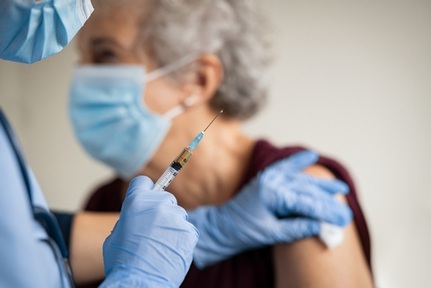Coronavirus vaccinations in care homes speeded up by approval of Oxford vaccine
The approval of the Oxford/AstraZeneca coronavirus vaccine will speed up the vaccination programme for the most vulnerable groups as it does not have to be stored at such cold temperatures as the other approved vaccine.

Health Secretary Matt Hancock has said care home residents will be included in the first rollout of the vaccine, starting from 4 January.
The Pfizer/BioNTech vaccine took several weeks after it was approved by the regulator on 2 December to start reaching care homes and although care home residents are a top priority group, with nearly half a million people living in care homes in the UK, the vaccination programme is still set to take months.
Mr Hancock told BBC Breakfast that the new vaccine will first be administered in hospitals “as the Pfizer vaccine was, and then we’ll be able to get out and vaccinate all the residents of care homes, or offer the vaccinations to all residents of care homes, and care home staff”.
He added: “But the need to keep the Pfizer vaccine at minus 70C has made it more challenging to get out, especially to some of the smaller care homes, and those limitations aren’t there for this Oxford AstraZeneca vaccine, so we can get out and vaccinate people who live in care homes who, of course, are some of the most vulnerable to this disease.”
The Oxford vaccine can be kept at temperatures between 2C and 8C and so can be used for care homes of different sizes and into private homes for individual doses.
Care home residents are being encouraged to have the vaccine but it is not mandatory. People with power of attorney can sign consent forms on behalf of residents without the mental capacity to consent.
Professor Martin Marshall, chair of the Royal College of GPs, called it “fantastic” that the Oxford/AstraZeneca vaccine has been approved for use in the UK.
He added: “This gives us another vital tool with which to protect patients against Covid-19 – and it will be a game changer for the roll out of the vaccination programme in primary care.
“It is the glimmer of light at the end of the tunnel that we desperately need to get us through this difficult winter and ultimately overcome the virus.
“GPs and our teams are already working incredibly hard delivering the Pfizer/BioNtech vaccine to our most vulnerable patients in the community, overcoming huge logistical challenges in doing so.
“This vaccine will overcome many of those challenges as it is much more like other vaccines already delivered in general practice, making it easier for GPs, our teams, and other primary care professionals to store it appropriately, and ultimately vaccinate a greater number of patients, at a faster pace in the community.”
Latest News
 29-Jul-24
Dementia Bus gives carehome.co.uk staff insight into life with dementia
29-Jul-24
Dementia Bus gives carehome.co.uk staff insight into life with dementia
 01-Mar-24
Find out the top care homes in 2024
01-Mar-24
Find out the top care homes in 2024
 21-Mar-23
UK's top care homes in 2023 revealed
21-Mar-23
UK's top care homes in 2023 revealed
 03-Jan-23
carehome.co.uk launches free care helpline
03-Jan-23
carehome.co.uk launches free care helpline
 13-Dec-22
5 mins with Emily Whitehurst, chief operating officer for Constantia Healthcare
13-Dec-22
5 mins with Emily Whitehurst, chief operating officer for Constantia Healthcare